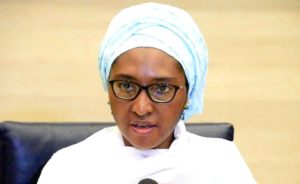The Minister of Finance, Budget and National Planning, Dr Zainab Ahmed has painted a gloomy picture of how insecurity, low earnings, and inability to meet the Organisation of the Petroleum Exporting Countries’ (OPEC) quota for oil production drove excessive borrowing by the Federal Government.
The minister, who unfolded these
scenarios at the public presentation of the 2022 FG budget proposal – breakdown and highlights in Abuja yesterday, however, insisted that Nigeria’s debt service/revenue ratio, which stands at 76 per cent as at November 2021, though higher than that of some African top economies proves that the challenge that confronts Nigeria is not that of debt sustainability but that of revenue.
Consumers of carbonated drinks are also expected to pay more as the Federal Government is set to introduce new and further increases in existing pro-health taxes on such drinks.
“There’s now an excise duty of N10/ per litre imposed on all non-alcoholic and sweetened beverages. And this is to discourage excessive consumption of sugar in beverages, which contributes to a number of health conditions including diabetes and obesity,” she said.
With the admission that the mounting debt profile is scary, Dr Ahmed held that Nigeria’s budget deficit to GDP, which stands at -4.3 per cent as of November 2021 and debt/GDP ratios of 30 per cent, as of September 2021, is the lowest among Africa’s leading economies.
She further stated that tax rates and compliance ratios are significantly higher in other countries, saying Nigeria’s Value Added Tax (VAT) is the lowest in Africa and less than 50 per cent of the average rate.
Revealing where most of Nigeria’s money has been going, she said: “To compound matters, the country has technically been at war, with the pervasive security challenges across the nation. This has necessitated massive expenditure on security equipment and operations, contributing to the fiscal deficit. The Defence and Security sector accounts for 22 per cent of the 2021 budget.”
This comes as the Federal Government expressed optimism that Nigeria will surpass the N1 trillion mark collection for independent revenues.
According to her, efforts aimed at addressing revenue leakages include concluding the service-wide implementation of Integrated Personnel and Payroll Information System (IPPIS), dimensioning cost of tax waivers and promoting policy dialogue and transparency around tax waiver regimes.
The Federal Government also restated its commitment to the removal of subsidies on petrol and electricity tariffs which it termed ‘regressive subsidies’ on petrol price and electricity tariffs.
The steps also include a cost-to-income ratio cap for government-owned enterprises with a view to improving remittances to FGN’s coffers.
She hinted efforts are ongoing to fix Nigeria’s revenue challenge, saying cutting expenditure is not currently a viable option, as Nigeria’s Public Expenditure/GDP ratio is also the lowest among Africa’s leading economies.






